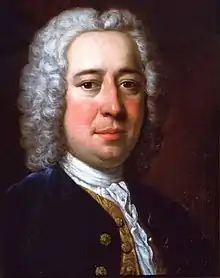Nicola Porpora
Nicola (Antonio) Porpora (or Niccolò Porpora) (17 August 1686 – 3 March 1768) was a composer and a very famous singing teacher from Italy. He composed more than 40 operas. He also composed cantatas, oratorios, sonatas for violin, and church music. Some of the famous people who studied singing and music with Porpora were the poet Pietro Metastasio, the composer Joseph Haydn, Princess Maria Antonia of Bavaria, and the castrato singers, Farinelli and Caffarelli.
Nicola Porpora | |
|---|---|
 | |
| Born | August 17, 1686 |
| Died | March 3, 1768 (aged 81) Naples |
| Nationality | Italian |
| Occupation(s) | Composer and singing teacher |
Life
Porpora was born in Naples. His father, Carlo Porpora, owned a book shop. When he was ten years old, Porpora began to study music at a famous music school in Naples called the Conservatorio dei Poveri di Gesù Cristo. He studied there for ten years. He composed his first opera, Agrippina, when he was 22 years old. It was about Agrippina the Younger, the mother of the Roman Emperor, Nero. Agrippina was first performed in 1708 at the Royal Palace in Naples.
At first, Porpora worked mostly in Naples, composing music and teaching singing. In 1726 he went to live in Venice where he taught singing and composed many operas. He lived in Venice for many years. During his life he also worked in Vienna, Dresden, and London. He went back to Naples to work two or three times. The last time was in 1758. He stayed in Naples for the rest of his life. He was a teacher at two music schools there, the Conservatorio di Santa Maria di Loreto and the Conservatorio di San Onofrio.
He wrote his last opera in 1760. It was called Il trionfo di Camilla (Camilla's Triumph). It was performed at the Teatro di San Carlo in Naples, but it was not a success. He retired from teaching in 1761. In the last years of his life, he had very little money. Porpora died in 1768. He was 81 years old. He is buried in the Church of Ecce Homo in Naples. Many singers and musicians performed at his funeral.
Recordings
There are several modern recordings of Porpora's music, especially his sonatas for violin and his church music. There is also a recording of arias from six of his operas. They are performed by the soprano, Karina Gauvin and the Complesso Barocco orchestra, conducted by Alan Curtis.[1]
References
- Vickers, David (March 2010). "Review: Porpora: Arias from Adelarcle, Ezio, Polifemo, Imeneo, Angelica and Arianna. Gramophone Magazine, p. 91.
- Grove, George (1900). "Porpora, Nicola", A Dictionary of Music and Musicians, Volume 3, pp. 16-18. MacMillan & Co
- Randel, Don Michael (ed.) (1996). "Porpora, Nicola (Antonio)" in The Harvard Biographical Dictionary of Music, pp. 702-703. Harvard University Press
Other websites
- The Porpora Project with a longer biography of Porpora and lists of his compositions.
- Nicola Porpora at the International Music Score Library Project